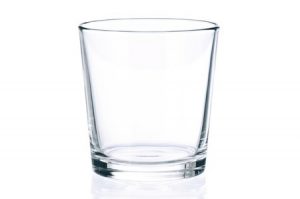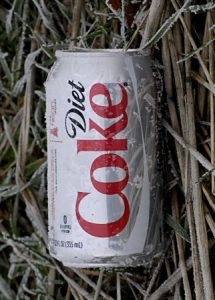
I don’t drink from my swimming pool, from a fish tank, or the public tap. Do you?
To answer this question, let’s revisit the safety of the chlorine in sucralose – brought to the good ole’ USA as Splenda®.
To begin … think about the crafty marketing of aspartame’s biggest competitor sucralose. It sounds a lot like sucrose, doesn’t it? For those who do not dig into the details of things, they think this is just sugar.
Well, that was the purpose.
Sucralose – sucrose. You say tomato – I say tamae-toe.
Well, as time goes on, the question I ask is sucralose/Splenda succeeding?
I don’t think it turned out to be the marketing blitz that they were expecting, but that said – it’s still on the market.
From My Book Splenda: Is It Safe Or Not?
We’ve done a great job of redefining sweetness, and it’s great to see it pay off,” said Anne Rewey, Splenda marketing director for Ft. Washington, Pennsylvania-based McNeil Corp. “We’re committed to the leadership position in this market.”
Sucralose (Splenda) is a chlorocarbon and is more accurately compared to ingesting tiny amounts of chlorinated pesticides.
Chlorocarbons have long been known for causing organ, genetic, and reproductive damage. It should be no surprise that the research reveals that chlorocarbons cause up to 40% shrinkage of the thymus: a gland that is the very foundation of your immune system.
Sucralose has been shown in research studies to cause swelling of the liver and kidneys, calcification of the kidneys, fertility issues in male rates, and gastrointestinal problems in pregnant rats.
Is that all?
Chlorine Reactions

If you experience kidney pain, cramping, swelling, an irritated bladder, or blood in your urine after using sucralose in Splenda, stop use immediately.
Sucralose (trichlorogalactosucrose) was approved by the FDA in 1988 as a tabletop sweetener and for use in a number of desserts, confections, and nonalcoholic beverages.
Isn’t it interesting that it didn’t come on the American market until the year 2000?
Splenda is approximately 600 times sweeter than sugar. but the sweetness is forced – it is not the same as a natural sugar that your body uses for energy and fuel.
People forget that sweetness is a by-product of foods; a bonus so to say. Forced sweetness, revved-up sweetness, and “super-sized” artificial sweetness – all a product of manufactured, altered foods – are a trap to addict people to sweeter tastes.
People with eating disorders, children who are just learning about food, and those with illnesses are being sold yet another “pile of rubbish.”
The following statement is from the manufacturer of Splenda:
Sucralose is made from sugar, but is derived from sucrose (sugar) through a process that selectively substitutes three atoms of chlorine for three hydrogen-oxygen groups on the sucrose molecule. No artificial sweetener made in the laboratory is going to be neither natural to the body nor safer than unprocessed sugar.”
Really?
The corporate researchers also claimed that the chlorine atoms in Splenda were altered to be so tightly bound, they create a molecular structure that is exceptionally stable under extreme pH and temperature conditions.
Based on my experience with chlorine in the environment, I do not agree with this statement, and feel that this “concept” of altering foods is dangerous to human health – any way you slice it.
The corporations claim that sucralose is safe. Hum – they said the same thing about aspartame, and look at the rampant disease and obesity taking over America since aspartame was put into the food supply in the 1980s.
After studying aspartame research, I learned to value independent research as opposed to the research studies funded by the corporations.
If you were a research scientist with the freedom to publish your real lab results – even though you were being paid by the inventor for your laboratory study – would you submit the good or the bad results?
Look at the history of aspartame and Splenda – the research proved damage to human health but that’s not what got published. It appears a pattern is repeating with the safety of all the chemical sugars.
You will read in both of my sweetener books that the lab animals fed aspartame and the chlorine in sucralose were at risk of developing cancer, infertility issues, and much more.
When I was an environmental field engineer, we depended upon the Merck Manuel and OSHA 40 SARA 120 Hazardous Waste Handbook to clearly state that chlorine is a carcinogen, and emergency procedures should be taken when exposed via swallowing, inhaling, or through the skin.
So, what’s the difference when it’s added to our food?
Today, the safety of chlorine added to our public water supply is being questioned as a cause of cancer. Now chlorine is marketed to children in diet colas, sweetener packets, ice creams, yogurts, processed foods, gums, candies, and mints.

The Diet Sweeteners
It is important to remember that an individual’s reaction to sucralose, as with aspartame, depends upon how much is used and how often, present and past health status, overall dietary habits, and the degree of other toxins present inside your body.
Corporate researchers claim sucralose has been thoroughly tested. Actually they have stated that sucralose is the most tested food additive in history.
…more than 100 studies on the safety of sucralose designed to meet the highest scientific standards have been conducted and evaluated over the course of 20 years.”
They stated, verbatim, the same thing about aspartame. We, consumers are witnessing the same state of affairs in many ways.
As with NutraSweet® – no recognized human studies have been done; but they have been done – just not promoted. It’s the corporate-payrolled-research responsible for the results submitted to the FDA, to the media, and to AMA journals.
I have determined that the problem is fueled by:
- only selective research results that are emphasized,
- millions of dollars spent on advertising,
- the lack of government involvement,
- ignoring clearly documented case histories (including death) amid the thousands of consumer complaints.
Here at The Hullisitc Network, we’ll keep pushing this information out to you so you can share it with those you love.

_____________
If you want to learn more about the diet sweeteners, Join my Private Inner Circle. I have written all about the sugar alcohols in my books on the diet sweeteners.
Gain access to all of my online programs, ongoing support, monthly Q&A, and more by joining my Private Inner Circle Membership Program. I look forward to supporting you on your journey to alternative health and wellness.
_____________
Disclaimer: This article is for informational purposes only, and is educational in nature. The FDA may not have evaluated some of the statements. This article is not intended to diagnose, treat, cure, or prevent any disease. Please discuss with your own, qualified health care provider before adding supplements or making any changes to your dietary program.
Before taking vitamins, consult your doctor; pre-existing medical conditions or medications you are taking can affect how your body responds to multivitamins.